Tourism increases water shortage in northern Oman
 Image: Andreas Bürkert
Image: Andreas BürkertThe goal of the project, which was funded by the German Research Foundation (DFG), was to compare changes in land use and water consumption in the Hajar Mountains of northern Oman between 2007 and 2018. The predominant land use patterns are agropastoral systems based on millennia-old oasis agriculture. It makes the region one of the most productive in the entire country. One finding of the study is that increasing urbanization, more private gardens and rising tourism are having a negative impact on water supplies; since 2007, the demand for water has been rising steadily.
The consequence of these developments is a fundamental change in land use. Forage crops in particular are giving way to the market-oriented cultivation of pomegranates, roses for the production of perfume and dates: Products that are especially popular with tourists. This further increases dependence on imported food. Livestock farming, which has been integrated into agriculture for centuries, is also declining because of the increasing number of new modern houses. These often have small gardens where trees or vegetables are planted, consuming additional water. Such transformation phenomena are not unique to Oman, but can be observed almost everywhere in the Arab region.
For their study, the team of German and Omani scientists used high-resolution satellite image-based analyses of settlement patterns and land use, surveys, yield measurements and crop mapping.
The research involved the Department of Organic Crop Production and Agroecosystem Research in the Tropics and Subtropics at the University of Kassel (Prof. Dr. Andreas Bürkert), the Department of Animal Husbandry in the Tropics and Subtropics (Universities of Kassel and Göttingen, Prof. Dr. Eva Schlecht), and a colleague from the Research Council in Oman (Dr. Mohammed Nasser Al Rawahi).
The original publication is located here: https://www.nature.com/articles/s41598-021-85515-9
Contact:
Prof. Dr. Andreas Bürkert
Kassel University
Department 11 - Ecological Agricultural Sciences
Department of Organic Crop Production and Agroecosystem Research in the Tropics and Subtropics (OPATS)
Phone +49 5542-98-1228
E-mail: buerkert@uni-kassel.de
Sebastian Mense
Kassel University
Press and Public Relations
Phone: +49 561 804 -1961
E-mail: presse[at]uni-kassel[dot]de